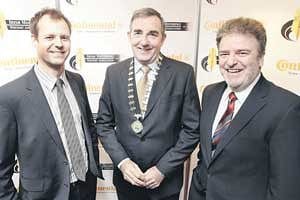
The forum was hosted by the Irish Motoring Writers Association and sponsored by Continental Tyres.
According to Mr Fredriksson, only 200,000 hectares of land would be needed to fuel Sweden’s car population with cellulosic biofuel, when considered in tandem with electric hybrid vehicles. On a world scale this would translate into 60 million hectares, of which Brazil could supply half without the need to impact on the rain forests. Africa presents a viable source for the remainder, he claimed.
This ‘holy grail’ of biofuels, which involves the use of low carbon soils, utilisation of biomass and ethanol-powered harvesting techniques, will be viable within six years, he said.
The challenge in tackling the twin issues of dwindling oil reserves and rising emissions simultaneously – against the backdrop of rising populations – can not be overestimated.
Sekab is the largest provider of biofuels in northern Europe and is a worldwide technology leader in developing the next generation of cellulose-based ethanol. The company has the world‘s first biofuel to be officially verified as sustainable on the basis of CO2 impact and social impact.
Currently, 30 per of car sales in Sweden are of FlexiFuel Vehicles (FFV) and they account for the top four selling models on the market. 90 per cent of FFV drivers fill up primarily with bioethanol.
“If this can happen in Sweden, it can happen anywhere, “ he claimed, citing the progress made in Ireland where several thousand FFVs have been sold. He also claimed the recent rise in diesel sales will peak, as EU directives will work against the fuel.
A panel discussion featured contributions from Colin Roche, policy and advocacy coordinator, Oxfam, Norbert Krüger of Ford of Europe, Noel McMullan from the Maxol Group and Bernard Rice, biofuels researcher with Teagasc. RTE presenter Rodney Rice was chairman.
Mr Rice maintained current production of biofuels in Ireland are a ‘no-brainer’ as they involve no land-use, and are “good on CO2”, being by-products of other production. He sees biofuels as an important outlet for maintaining cereal production here and emphasised the need to develop a biomass resource sooner rather than later.
“We need a first generation biofuel capability to pave the way for second generation,” he said.
“Biofuel is a topic that engenders emotive and sometimes ill-informed comment,“ commented Tony Toner, chairman of the Irish Motoring Writers Association. “In bringing a leading player in the sector to Ireland, I would like to think the motoring writers are making a contribution to the debate on sustainable mobility in this country”.
Paddy Murphy, of sponsors Continental Tyres, commented: “All sectors of the motor industry share the goal of reducing CO2 emissions. In the tyre sector this is translating into low rolling resistance tyres, for example. But it’s the consumer, not the developer, who can contribute most to this goal, by keeping his or her tyres correctly inflated. As well as extending the life of the tyre, it also ensures they are safe.”
The Forum was attended by policymakers from state bodies, local authorities, universities and representatives from the car and alternative energy sectors




